Sustainable Procurement: Supplier Evaluation Criteria for Tesco and Effects of COVID-19 Pandemic and New Technologies
VerifiedAdded on 2023/06/11
|12
|3899
|245
AI Summary
This report discusses the importance of sustainable procurement and supplier evaluation criteria for Tesco, the effects of COVID-19 pandemic and new technologies on Tesco's supplier selection, and the impact of Tesco's stakeholder relationships and institutional pressures on their supplier selection. The report also covers the impact of supplier selection on the firm's corporate reputation.
Contribute Materials
Your contribution can guide someone’s learning journey. Share your
documents today.
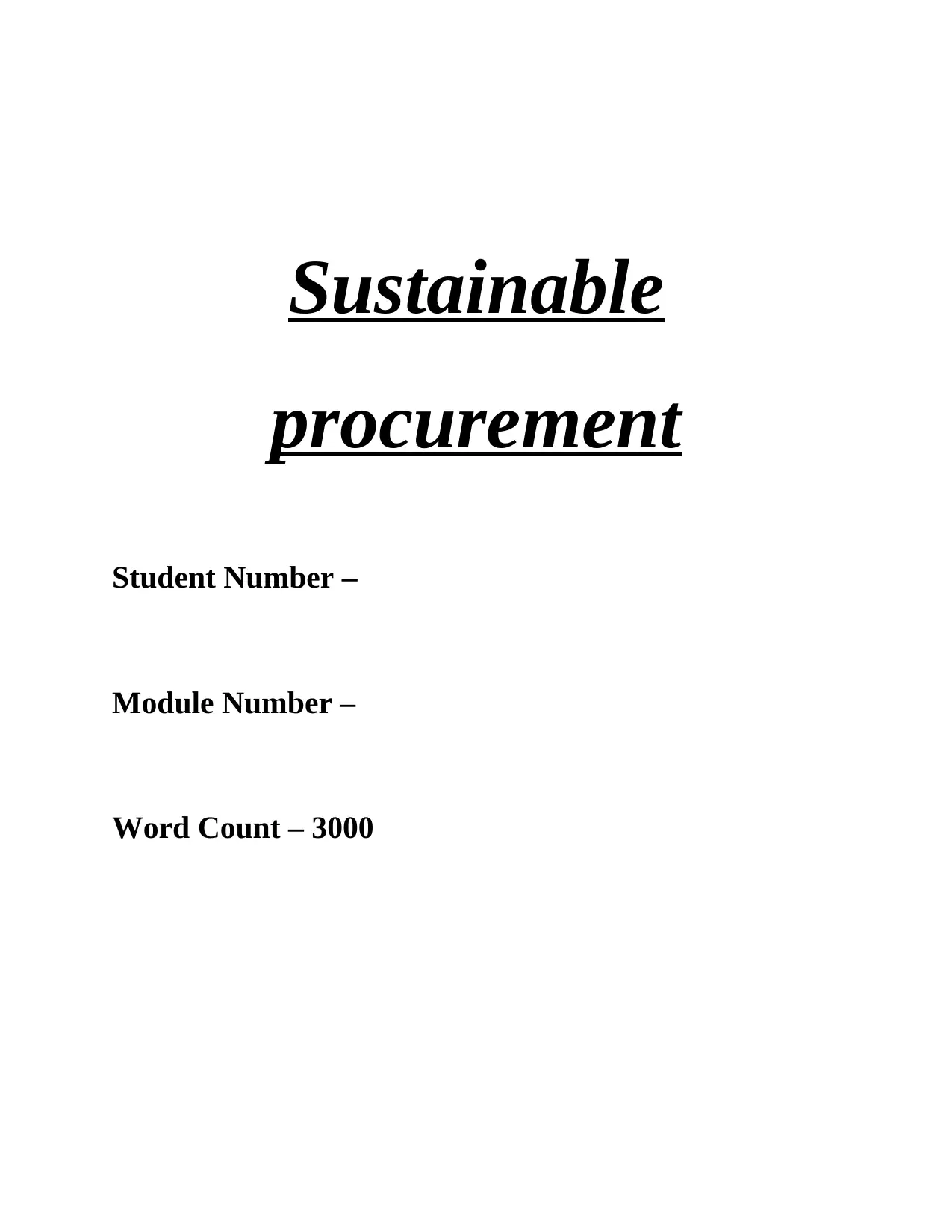
Sustainable
procurement
Student Number –
Module Number –
Word Count – 3000
procurement
Student Number –
Module Number –
Word Count – 3000
Secure Best Marks with AI Grader
Need help grading? Try our AI Grader for instant feedback on your assignments.
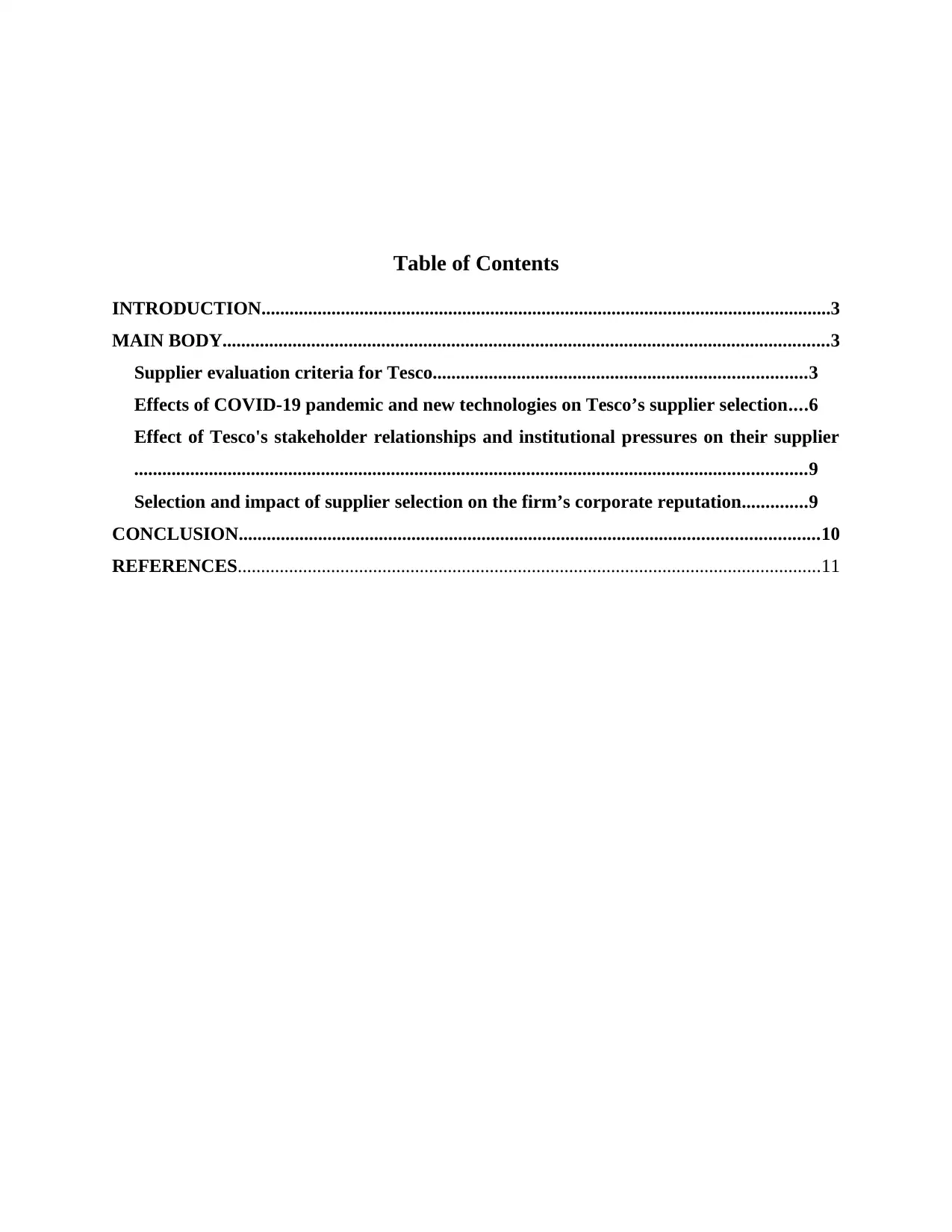
Table of Contents
INTRODUCTION..........................................................................................................................3
MAIN BODY..................................................................................................................................3
Supplier evaluation criteria for Tesco................................................................................3
Effects of COVID-19 pandemic and new technologies on Tesco’s supplier selection....6
Effect of Tesco's stakeholder relationships and institutional pressures on their supplier
................................................................................................................................................9
Selection and impact of supplier selection on the firm’s corporate reputation..............9
CONCLUSION............................................................................................................................10
REFERENCES.............................................................................................................................11
INTRODUCTION..........................................................................................................................3
MAIN BODY..................................................................................................................................3
Supplier evaluation criteria for Tesco................................................................................3
Effects of COVID-19 pandemic and new technologies on Tesco’s supplier selection....6
Effect of Tesco's stakeholder relationships and institutional pressures on their supplier
................................................................................................................................................9
Selection and impact of supplier selection on the firm’s corporate reputation..............9
CONCLUSION............................................................................................................................10
REFERENCES.............................................................................................................................11
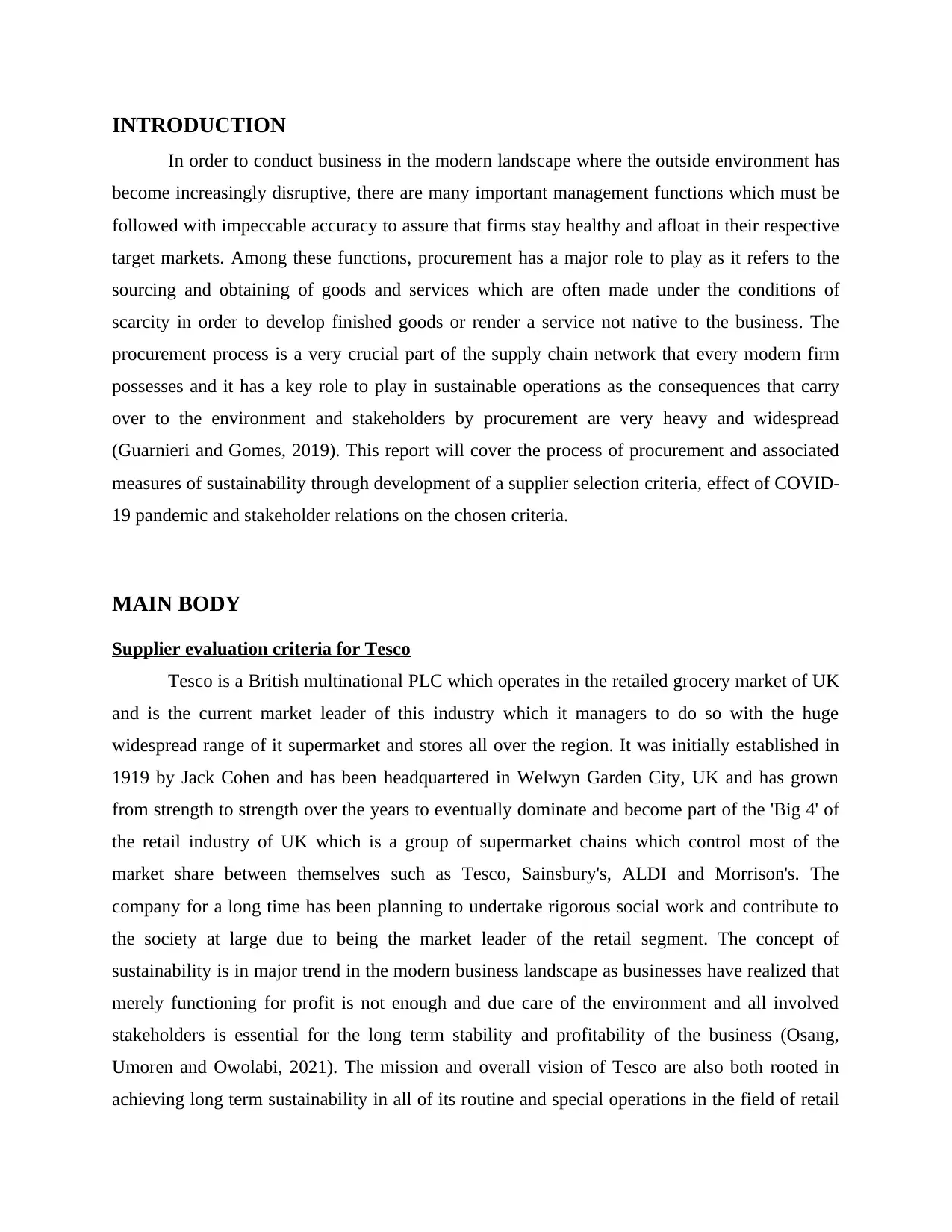
INTRODUCTION
In order to conduct business in the modern landscape where the outside environment has
become increasingly disruptive, there are many important management functions which must be
followed with impeccable accuracy to assure that firms stay healthy and afloat in their respective
target markets. Among these functions, procurement has a major role to play as it refers to the
sourcing and obtaining of goods and services which are often made under the conditions of
scarcity in order to develop finished goods or render a service not native to the business. The
procurement process is a very crucial part of the supply chain network that every modern firm
possesses and it has a key role to play in sustainable operations as the consequences that carry
over to the environment and stakeholders by procurement are very heavy and widespread
(Guarnieri and Gomes, 2019). This report will cover the process of procurement and associated
measures of sustainability through development of a supplier selection criteria, effect of COVID-
19 pandemic and stakeholder relations on the chosen criteria.
MAIN BODY
Supplier evaluation criteria for Tesco
Tesco is a British multinational PLC which operates in the retailed grocery market of UK
and is the current market leader of this industry which it managers to do so with the huge
widespread range of it supermarket and stores all over the region. It was initially established in
1919 by Jack Cohen and has been headquartered in Welwyn Garden City, UK and has grown
from strength to strength over the years to eventually dominate and become part of the 'Big 4' of
the retail industry of UK which is a group of supermarket chains which control most of the
market share between themselves such as Tesco, Sainsbury's, ALDI and Morrison's. The
company for a long time has been planning to undertake rigorous social work and contribute to
the society at large due to being the market leader of the retail segment. The concept of
sustainability is in major trend in the modern business landscape as businesses have realized that
merely functioning for profit is not enough and due care of the environment and all involved
stakeholders is essential for the long term stability and profitability of the business (Osang,
Umoren and Owolabi, 2021). The mission and overall vision of Tesco are also both rooted in
achieving long term sustainability in all of its routine and special operations in the field of retail
In order to conduct business in the modern landscape where the outside environment has
become increasingly disruptive, there are many important management functions which must be
followed with impeccable accuracy to assure that firms stay healthy and afloat in their respective
target markets. Among these functions, procurement has a major role to play as it refers to the
sourcing and obtaining of goods and services which are often made under the conditions of
scarcity in order to develop finished goods or render a service not native to the business. The
procurement process is a very crucial part of the supply chain network that every modern firm
possesses and it has a key role to play in sustainable operations as the consequences that carry
over to the environment and stakeholders by procurement are very heavy and widespread
(Guarnieri and Gomes, 2019). This report will cover the process of procurement and associated
measures of sustainability through development of a supplier selection criteria, effect of COVID-
19 pandemic and stakeholder relations on the chosen criteria.
MAIN BODY
Supplier evaluation criteria for Tesco
Tesco is a British multinational PLC which operates in the retailed grocery market of UK
and is the current market leader of this industry which it managers to do so with the huge
widespread range of it supermarket and stores all over the region. It was initially established in
1919 by Jack Cohen and has been headquartered in Welwyn Garden City, UK and has grown
from strength to strength over the years to eventually dominate and become part of the 'Big 4' of
the retail industry of UK which is a group of supermarket chains which control most of the
market share between themselves such as Tesco, Sainsbury's, ALDI and Morrison's. The
company for a long time has been planning to undertake rigorous social work and contribute to
the society at large due to being the market leader of the retail segment. The concept of
sustainability is in major trend in the modern business landscape as businesses have realized that
merely functioning for profit is not enough and due care of the environment and all involved
stakeholders is essential for the long term stability and profitability of the business (Osang,
Umoren and Owolabi, 2021). The mission and overall vision of Tesco are also both rooted in
achieving long term sustainability in all of its routine and special operations in the field of retail
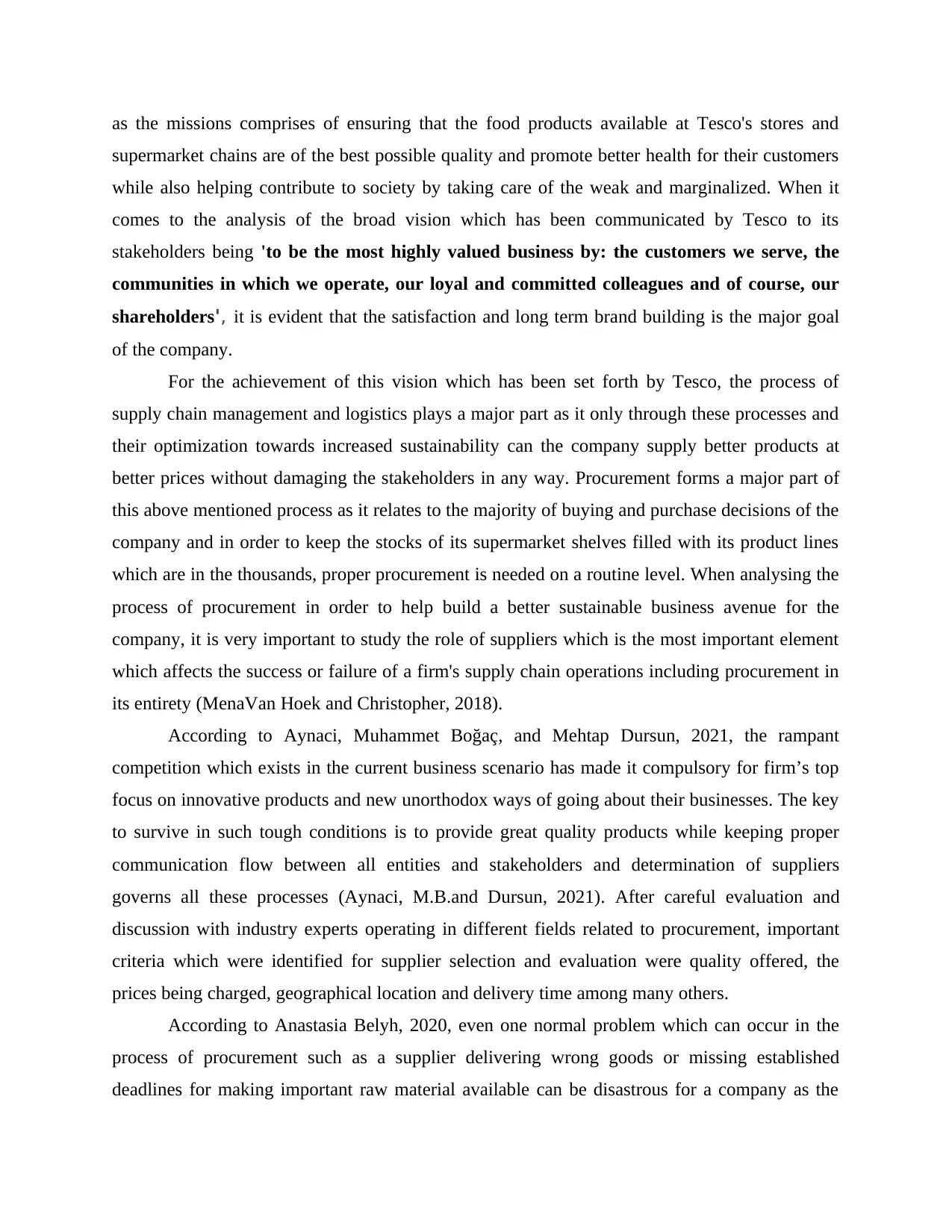
as the missions comprises of ensuring that the food products available at Tesco's stores and
supermarket chains are of the best possible quality and promote better health for their customers
while also helping contribute to society by taking care of the weak and marginalized. When it
comes to the analysis of the broad vision which has been communicated by Tesco to its
stakeholders being 'to be the most highly valued business by: the customers we serve, the
communities in which we operate, our loyal and committed colleagues and of course, our
shareholders', it is evident that the satisfaction and long term brand building is the major goal
of the company.
For the achievement of this vision which has been set forth by Tesco, the process of
supply chain management and logistics plays a major part as it only through these processes and
their optimization towards increased sustainability can the company supply better products at
better prices without damaging the stakeholders in any way. Procurement forms a major part of
this above mentioned process as it relates to the majority of buying and purchase decisions of the
company and in order to keep the stocks of its supermarket shelves filled with its product lines
which are in the thousands, proper procurement is needed on a routine level. When analysing the
process of procurement in order to help build a better sustainable business avenue for the
company, it is very important to study the role of suppliers which is the most important element
which affects the success or failure of a firm's supply chain operations including procurement in
its entirety (MenaVan Hoek and Christopher, 2018).
According to Aynaci, Muhammet Boğaç, and Mehtap Dursun, 2021, the rampant
competition which exists in the current business scenario has made it compulsory for firm’s top
focus on innovative products and new unorthodox ways of going about their businesses. The key
to survive in such tough conditions is to provide great quality products while keeping proper
communication flow between all entities and stakeholders and determination of suppliers
governs all these processes (Aynaci, M.B.and Dursun, 2021). After careful evaluation and
discussion with industry experts operating in different fields related to procurement, important
criteria which were identified for supplier selection and evaluation were quality offered, the
prices being charged, geographical location and delivery time among many others.
According to Anastasia Belyh, 2020, even one normal problem which can occur in the
process of procurement such as a supplier delivering wrong goods or missing established
deadlines for making important raw material available can be disastrous for a company as the
supermarket chains are of the best possible quality and promote better health for their customers
while also helping contribute to society by taking care of the weak and marginalized. When it
comes to the analysis of the broad vision which has been communicated by Tesco to its
stakeholders being 'to be the most highly valued business by: the customers we serve, the
communities in which we operate, our loyal and committed colleagues and of course, our
shareholders', it is evident that the satisfaction and long term brand building is the major goal
of the company.
For the achievement of this vision which has been set forth by Tesco, the process of
supply chain management and logistics plays a major part as it only through these processes and
their optimization towards increased sustainability can the company supply better products at
better prices without damaging the stakeholders in any way. Procurement forms a major part of
this above mentioned process as it relates to the majority of buying and purchase decisions of the
company and in order to keep the stocks of its supermarket shelves filled with its product lines
which are in the thousands, proper procurement is needed on a routine level. When analysing the
process of procurement in order to help build a better sustainable business avenue for the
company, it is very important to study the role of suppliers which is the most important element
which affects the success or failure of a firm's supply chain operations including procurement in
its entirety (MenaVan Hoek and Christopher, 2018).
According to Aynaci, Muhammet Boğaç, and Mehtap Dursun, 2021, the rampant
competition which exists in the current business scenario has made it compulsory for firm’s top
focus on innovative products and new unorthodox ways of going about their businesses. The key
to survive in such tough conditions is to provide great quality products while keeping proper
communication flow between all entities and stakeholders and determination of suppliers
governs all these processes (Aynaci, M.B.and Dursun, 2021). After careful evaluation and
discussion with industry experts operating in different fields related to procurement, important
criteria which were identified for supplier selection and evaluation were quality offered, the
prices being charged, geographical location and delivery time among many others.
According to Anastasia Belyh, 2020, even one normal problem which can occur in the
process of procurement such as a supplier delivering wrong goods or missing established
deadlines for making important raw material available can be disastrous for a company as the
Secure Best Marks with AI Grader
Need help grading? Try our AI Grader for instant feedback on your assignments.
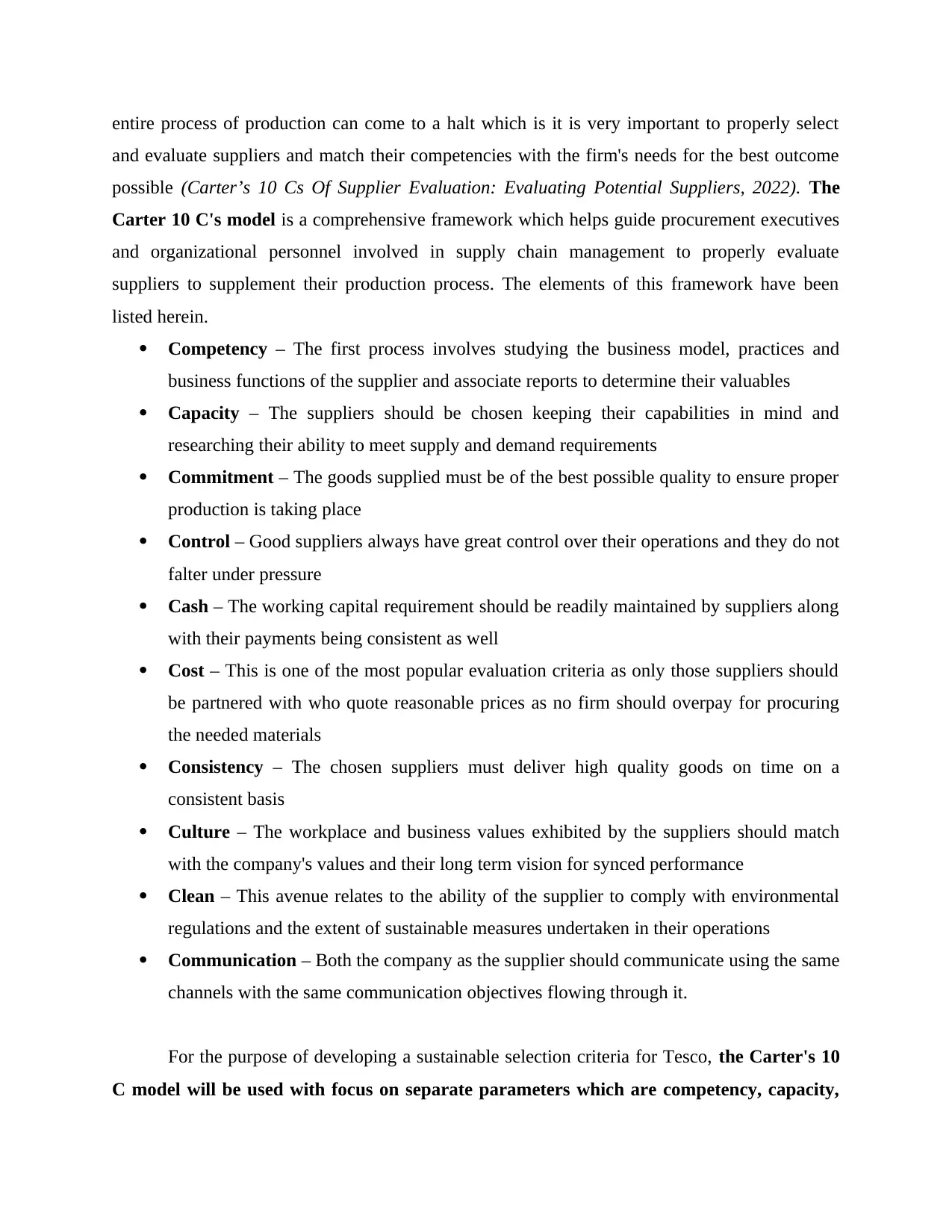
entire process of production can come to a halt which is it is very important to properly select
and evaluate suppliers and match their competencies with the firm's needs for the best outcome
possible (Carter’s 10 Cs Of Supplier Evaluation: Evaluating Potential Suppliers, 2022). The
Carter 10 C's model is a comprehensive framework which helps guide procurement executives
and organizational personnel involved in supply chain management to properly evaluate
suppliers to supplement their production process. The elements of this framework have been
listed herein.
Competency – The first process involves studying the business model, practices and
business functions of the supplier and associate reports to determine their valuables
Capacity – The suppliers should be chosen keeping their capabilities in mind and
researching their ability to meet supply and demand requirements
Commitment – The goods supplied must be of the best possible quality to ensure proper
production is taking place
Control – Good suppliers always have great control over their operations and they do not
falter under pressure
Cash – The working capital requirement should be readily maintained by suppliers along
with their payments being consistent as well
Cost – This is one of the most popular evaluation criteria as only those suppliers should
be partnered with who quote reasonable prices as no firm should overpay for procuring
the needed materials
Consistency – The chosen suppliers must deliver high quality goods on time on a
consistent basis
Culture – The workplace and business values exhibited by the suppliers should match
with the company's values and their long term vision for synced performance
Clean – This avenue relates to the ability of the supplier to comply with environmental
regulations and the extent of sustainable measures undertaken in their operations
Communication – Both the company as the supplier should communicate using the same
channels with the same communication objectives flowing through it.
For the purpose of developing a sustainable selection criteria for Tesco, the Carter's 10
C model will be used with focus on separate parameters which are competency, capacity,
and evaluate suppliers and match their competencies with the firm's needs for the best outcome
possible (Carter’s 10 Cs Of Supplier Evaluation: Evaluating Potential Suppliers, 2022). The
Carter 10 C's model is a comprehensive framework which helps guide procurement executives
and organizational personnel involved in supply chain management to properly evaluate
suppliers to supplement their production process. The elements of this framework have been
listed herein.
Competency – The first process involves studying the business model, practices and
business functions of the supplier and associate reports to determine their valuables
Capacity – The suppliers should be chosen keeping their capabilities in mind and
researching their ability to meet supply and demand requirements
Commitment – The goods supplied must be of the best possible quality to ensure proper
production is taking place
Control – Good suppliers always have great control over their operations and they do not
falter under pressure
Cash – The working capital requirement should be readily maintained by suppliers along
with their payments being consistent as well
Cost – This is one of the most popular evaluation criteria as only those suppliers should
be partnered with who quote reasonable prices as no firm should overpay for procuring
the needed materials
Consistency – The chosen suppliers must deliver high quality goods on time on a
consistent basis
Culture – The workplace and business values exhibited by the suppliers should match
with the company's values and their long term vision for synced performance
Clean – This avenue relates to the ability of the supplier to comply with environmental
regulations and the extent of sustainable measures undertaken in their operations
Communication – Both the company as the supplier should communicate using the same
channels with the same communication objectives flowing through it.
For the purpose of developing a sustainable selection criteria for Tesco, the Carter's 10
C model will be used with focus on separate parameters which are competency, capacity,
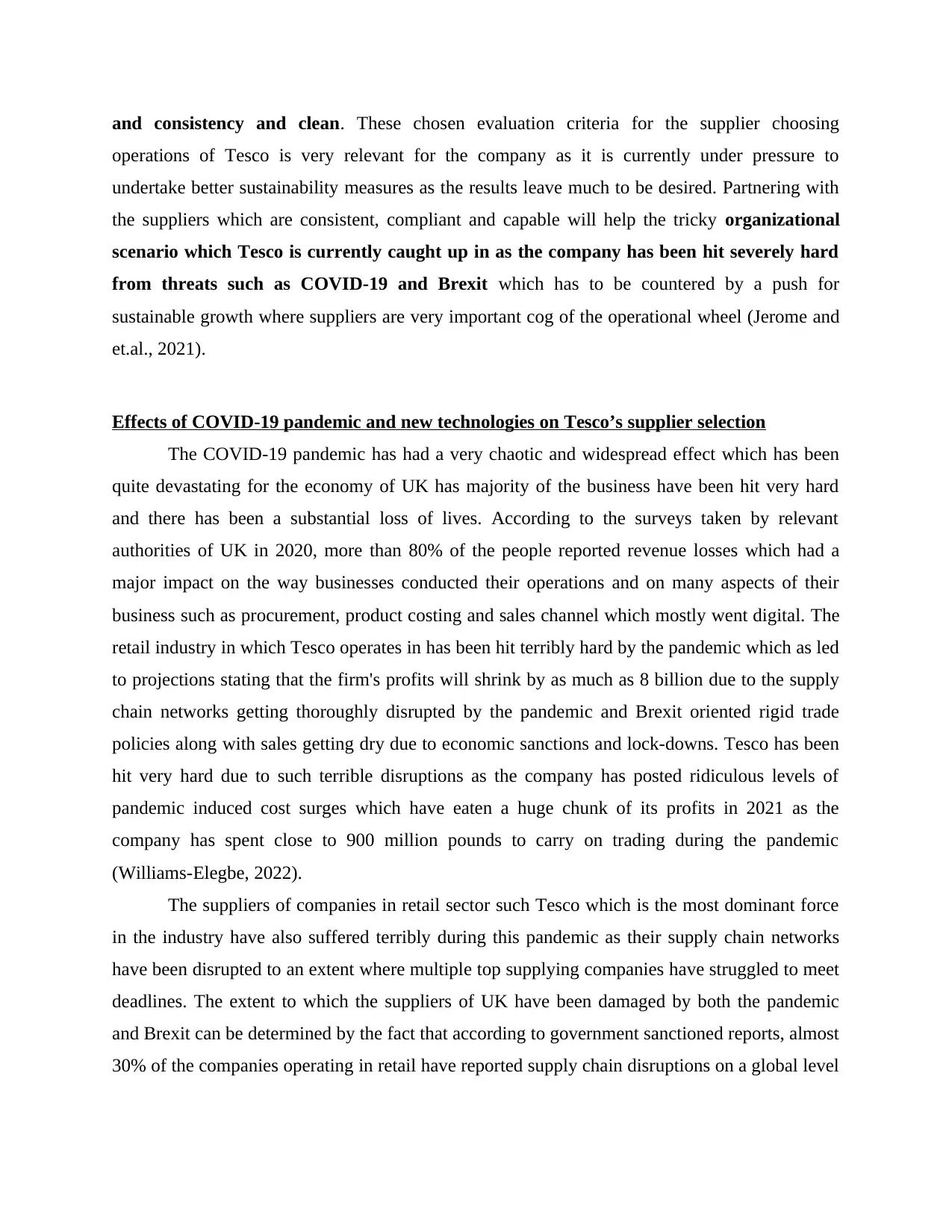
and consistency and clean. These chosen evaluation criteria for the supplier choosing
operations of Tesco is very relevant for the company as it is currently under pressure to
undertake better sustainability measures as the results leave much to be desired. Partnering with
the suppliers which are consistent, compliant and capable will help the tricky organizational
scenario which Tesco is currently caught up in as the company has been hit severely hard
from threats such as COVID-19 and Brexit which has to be countered by a push for
sustainable growth where suppliers are very important cog of the operational wheel (Jerome and
et.al., 2021).
Effects of COVID-19 pandemic and new technologies on Tesco’s supplier selection
The COVID-19 pandemic has had a very chaotic and widespread effect which has been
quite devastating for the economy of UK has majority of the business have been hit very hard
and there has been a substantial loss of lives. According to the surveys taken by relevant
authorities of UK in 2020, more than 80% of the people reported revenue losses which had a
major impact on the way businesses conducted their operations and on many aspects of their
business such as procurement, product costing and sales channel which mostly went digital. The
retail industry in which Tesco operates in has been hit terribly hard by the pandemic which as led
to projections stating that the firm's profits will shrink by as much as 8 billion due to the supply
chain networks getting thoroughly disrupted by the pandemic and Brexit oriented rigid trade
policies along with sales getting dry due to economic sanctions and lock-downs. Tesco has been
hit very hard due to such terrible disruptions as the company has posted ridiculous levels of
pandemic induced cost surges which have eaten a huge chunk of its profits in 2021 as the
company has spent close to 900 million pounds to carry on trading during the pandemic
(Williams-Elegbe, 2022).
The suppliers of companies in retail sector such Tesco which is the most dominant force
in the industry have also suffered terribly during this pandemic as their supply chain networks
have been disrupted to an extent where multiple top supplying companies have struggled to meet
deadlines. The extent to which the suppliers of UK have been damaged by both the pandemic
and Brexit can be determined by the fact that according to government sanctioned reports, almost
30% of the companies operating in retail have reported supply chain disruptions on a global level
operations of Tesco is very relevant for the company as it is currently under pressure to
undertake better sustainability measures as the results leave much to be desired. Partnering with
the suppliers which are consistent, compliant and capable will help the tricky organizational
scenario which Tesco is currently caught up in as the company has been hit severely hard
from threats such as COVID-19 and Brexit which has to be countered by a push for
sustainable growth where suppliers are very important cog of the operational wheel (Jerome and
et.al., 2021).
Effects of COVID-19 pandemic and new technologies on Tesco’s supplier selection
The COVID-19 pandemic has had a very chaotic and widespread effect which has been
quite devastating for the economy of UK has majority of the business have been hit very hard
and there has been a substantial loss of lives. According to the surveys taken by relevant
authorities of UK in 2020, more than 80% of the people reported revenue losses which had a
major impact on the way businesses conducted their operations and on many aspects of their
business such as procurement, product costing and sales channel which mostly went digital. The
retail industry in which Tesco operates in has been hit terribly hard by the pandemic which as led
to projections stating that the firm's profits will shrink by as much as 8 billion due to the supply
chain networks getting thoroughly disrupted by the pandemic and Brexit oriented rigid trade
policies along with sales getting dry due to economic sanctions and lock-downs. Tesco has been
hit very hard due to such terrible disruptions as the company has posted ridiculous levels of
pandemic induced cost surges which have eaten a huge chunk of its profits in 2021 as the
company has spent close to 900 million pounds to carry on trading during the pandemic
(Williams-Elegbe, 2022).
The suppliers of companies in retail sector such Tesco which is the most dominant force
in the industry have also suffered terribly during this pandemic as their supply chain networks
have been disrupted to an extent where multiple top supplying companies have struggled to meet
deadlines. The extent to which the suppliers of UK have been damaged by both the pandemic
and Brexit can be determined by the fact that according to government sanctioned reports, almost
30% of the companies operating in retail have reported supply chain disruptions on a global level
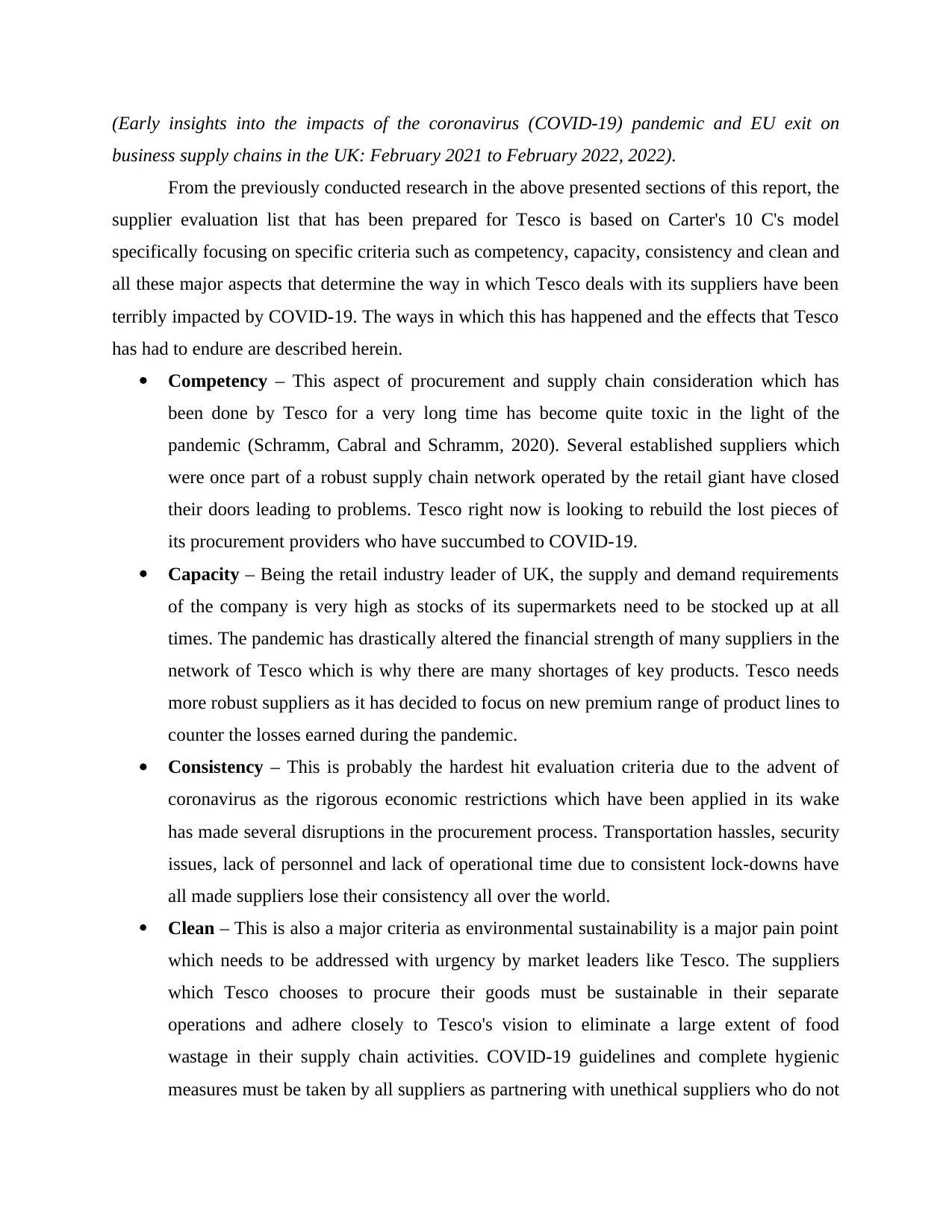
(Early insights into the impacts of the coronavirus (COVID-19) pandemic and EU exit on
business supply chains in the UK: February 2021 to February 2022, 2022).
From the previously conducted research in the above presented sections of this report, the
supplier evaluation list that has been prepared for Tesco is based on Carter's 10 C's model
specifically focusing on specific criteria such as competency, capacity, consistency and clean and
all these major aspects that determine the way in which Tesco deals with its suppliers have been
terribly impacted by COVID-19. The ways in which this has happened and the effects that Tesco
has had to endure are described herein.
Competency – This aspect of procurement and supply chain consideration which has
been done by Tesco for a very long time has become quite toxic in the light of the
pandemic (Schramm, Cabral and Schramm, 2020). Several established suppliers which
were once part of a robust supply chain network operated by the retail giant have closed
their doors leading to problems. Tesco right now is looking to rebuild the lost pieces of
its procurement providers who have succumbed to COVID-19.
Capacity – Being the retail industry leader of UK, the supply and demand requirements
of the company is very high as stocks of its supermarkets need to be stocked up at all
times. The pandemic has drastically altered the financial strength of many suppliers in the
network of Tesco which is why there are many shortages of key products. Tesco needs
more robust suppliers as it has decided to focus on new premium range of product lines to
counter the losses earned during the pandemic.
Consistency – This is probably the hardest hit evaluation criteria due to the advent of
coronavirus as the rigorous economic restrictions which have been applied in its wake
has made several disruptions in the procurement process. Transportation hassles, security
issues, lack of personnel and lack of operational time due to consistent lock-downs have
all made suppliers lose their consistency all over the world.
Clean – This is also a major criteria as environmental sustainability is a major pain point
which needs to be addressed with urgency by market leaders like Tesco. The suppliers
which Tesco chooses to procure their goods must be sustainable in their separate
operations and adhere closely to Tesco's vision to eliminate a large extent of food
wastage in their supply chain activities. COVID-19 guidelines and complete hygienic
measures must be taken by all suppliers as partnering with unethical suppliers who do not
business supply chains in the UK: February 2021 to February 2022, 2022).
From the previously conducted research in the above presented sections of this report, the
supplier evaluation list that has been prepared for Tesco is based on Carter's 10 C's model
specifically focusing on specific criteria such as competency, capacity, consistency and clean and
all these major aspects that determine the way in which Tesco deals with its suppliers have been
terribly impacted by COVID-19. The ways in which this has happened and the effects that Tesco
has had to endure are described herein.
Competency – This aspect of procurement and supply chain consideration which has
been done by Tesco for a very long time has become quite toxic in the light of the
pandemic (Schramm, Cabral and Schramm, 2020). Several established suppliers which
were once part of a robust supply chain network operated by the retail giant have closed
their doors leading to problems. Tesco right now is looking to rebuild the lost pieces of
its procurement providers who have succumbed to COVID-19.
Capacity – Being the retail industry leader of UK, the supply and demand requirements
of the company is very high as stocks of its supermarkets need to be stocked up at all
times. The pandemic has drastically altered the financial strength of many suppliers in the
network of Tesco which is why there are many shortages of key products. Tesco needs
more robust suppliers as it has decided to focus on new premium range of product lines to
counter the losses earned during the pandemic.
Consistency – This is probably the hardest hit evaluation criteria due to the advent of
coronavirus as the rigorous economic restrictions which have been applied in its wake
has made several disruptions in the procurement process. Transportation hassles, security
issues, lack of personnel and lack of operational time due to consistent lock-downs have
all made suppliers lose their consistency all over the world.
Clean – This is also a major criteria as environmental sustainability is a major pain point
which needs to be addressed with urgency by market leaders like Tesco. The suppliers
which Tesco chooses to procure their goods must be sustainable in their separate
operations and adhere closely to Tesco's vision to eliminate a large extent of food
wastage in their supply chain activities. COVID-19 guidelines and complete hygienic
measures must be taken by all suppliers as partnering with unethical suppliers who do not
Paraphrase This Document
Need a fresh take? Get an instant paraphrase of this document with our AI Paraphraser
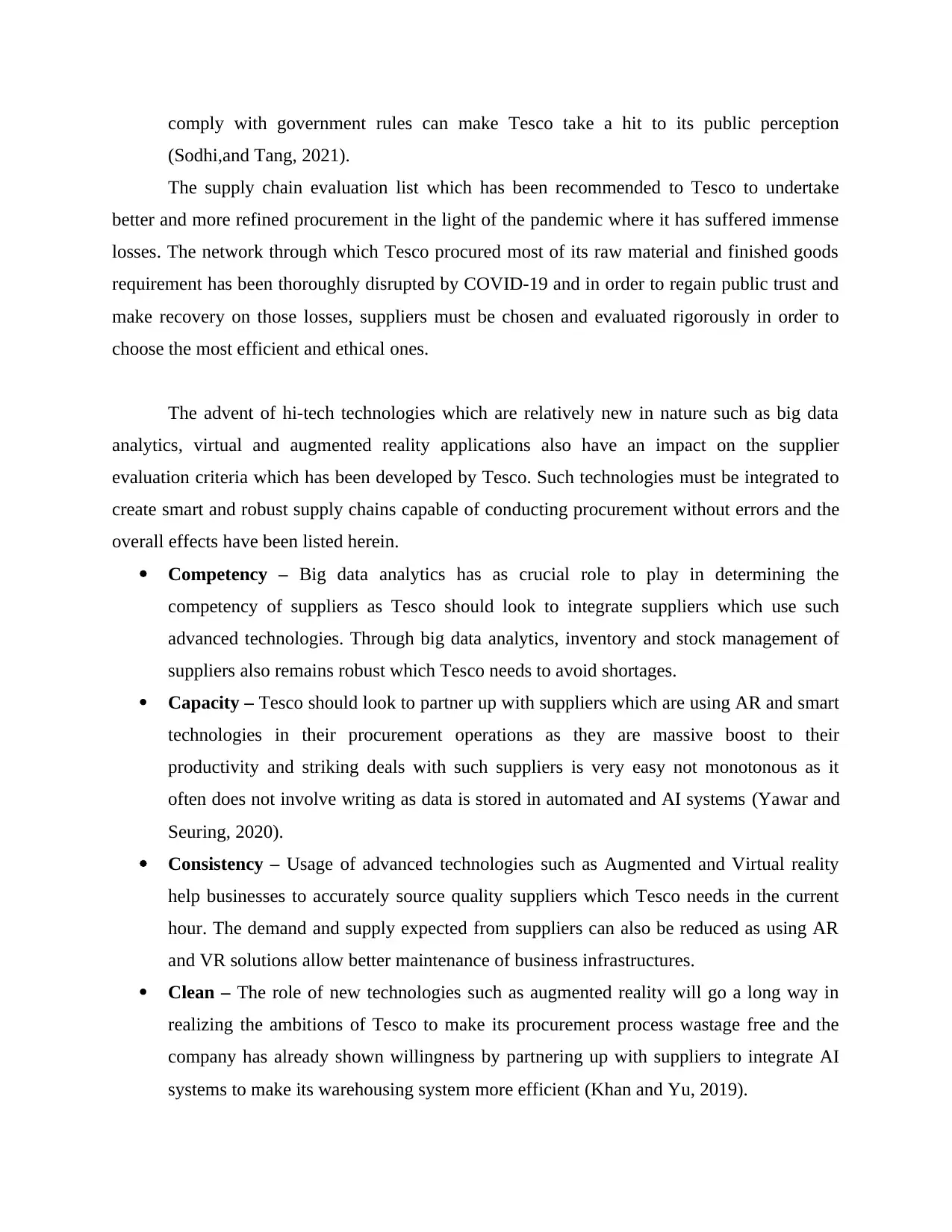
comply with government rules can make Tesco take a hit to its public perception
(Sodhi,and Tang, 2021).
The supply chain evaluation list which has been recommended to Tesco to undertake
better and more refined procurement in the light of the pandemic where it has suffered immense
losses. The network through which Tesco procured most of its raw material and finished goods
requirement has been thoroughly disrupted by COVID-19 and in order to regain public trust and
make recovery on those losses, suppliers must be chosen and evaluated rigorously in order to
choose the most efficient and ethical ones.
The advent of hi-tech technologies which are relatively new in nature such as big data
analytics, virtual and augmented reality applications also have an impact on the supplier
evaluation criteria which has been developed by Tesco. Such technologies must be integrated to
create smart and robust supply chains capable of conducting procurement without errors and the
overall effects have been listed herein.
Competency – Big data analytics has as crucial role to play in determining the
competency of suppliers as Tesco should look to integrate suppliers which use such
advanced technologies. Through big data analytics, inventory and stock management of
suppliers also remains robust which Tesco needs to avoid shortages.
Capacity – Tesco should look to partner up with suppliers which are using AR and smart
technologies in their procurement operations as they are massive boost to their
productivity and striking deals with such suppliers is very easy not monotonous as it
often does not involve writing as data is stored in automated and AI systems (Yawar and
Seuring, 2020).
Consistency – Usage of advanced technologies such as Augmented and Virtual reality
help businesses to accurately source quality suppliers which Tesco needs in the current
hour. The demand and supply expected from suppliers can also be reduced as using AR
and VR solutions allow better maintenance of business infrastructures.
Clean – The role of new technologies such as augmented reality will go a long way in
realizing the ambitions of Tesco to make its procurement process wastage free and the
company has already shown willingness by partnering up with suppliers to integrate AI
systems to make its warehousing system more efficient (Khan and Yu, 2019).
(Sodhi,and Tang, 2021).
The supply chain evaluation list which has been recommended to Tesco to undertake
better and more refined procurement in the light of the pandemic where it has suffered immense
losses. The network through which Tesco procured most of its raw material and finished goods
requirement has been thoroughly disrupted by COVID-19 and in order to regain public trust and
make recovery on those losses, suppliers must be chosen and evaluated rigorously in order to
choose the most efficient and ethical ones.
The advent of hi-tech technologies which are relatively new in nature such as big data
analytics, virtual and augmented reality applications also have an impact on the supplier
evaluation criteria which has been developed by Tesco. Such technologies must be integrated to
create smart and robust supply chains capable of conducting procurement without errors and the
overall effects have been listed herein.
Competency – Big data analytics has as crucial role to play in determining the
competency of suppliers as Tesco should look to integrate suppliers which use such
advanced technologies. Through big data analytics, inventory and stock management of
suppliers also remains robust which Tesco needs to avoid shortages.
Capacity – Tesco should look to partner up with suppliers which are using AR and smart
technologies in their procurement operations as they are massive boost to their
productivity and striking deals with such suppliers is very easy not monotonous as it
often does not involve writing as data is stored in automated and AI systems (Yawar and
Seuring, 2020).
Consistency – Usage of advanced technologies such as Augmented and Virtual reality
help businesses to accurately source quality suppliers which Tesco needs in the current
hour. The demand and supply expected from suppliers can also be reduced as using AR
and VR solutions allow better maintenance of business infrastructures.
Clean – The role of new technologies such as augmented reality will go a long way in
realizing the ambitions of Tesco to make its procurement process wastage free and the
company has already shown willingness by partnering up with suppliers to integrate AI
systems to make its warehousing system more efficient (Khan and Yu, 2019).
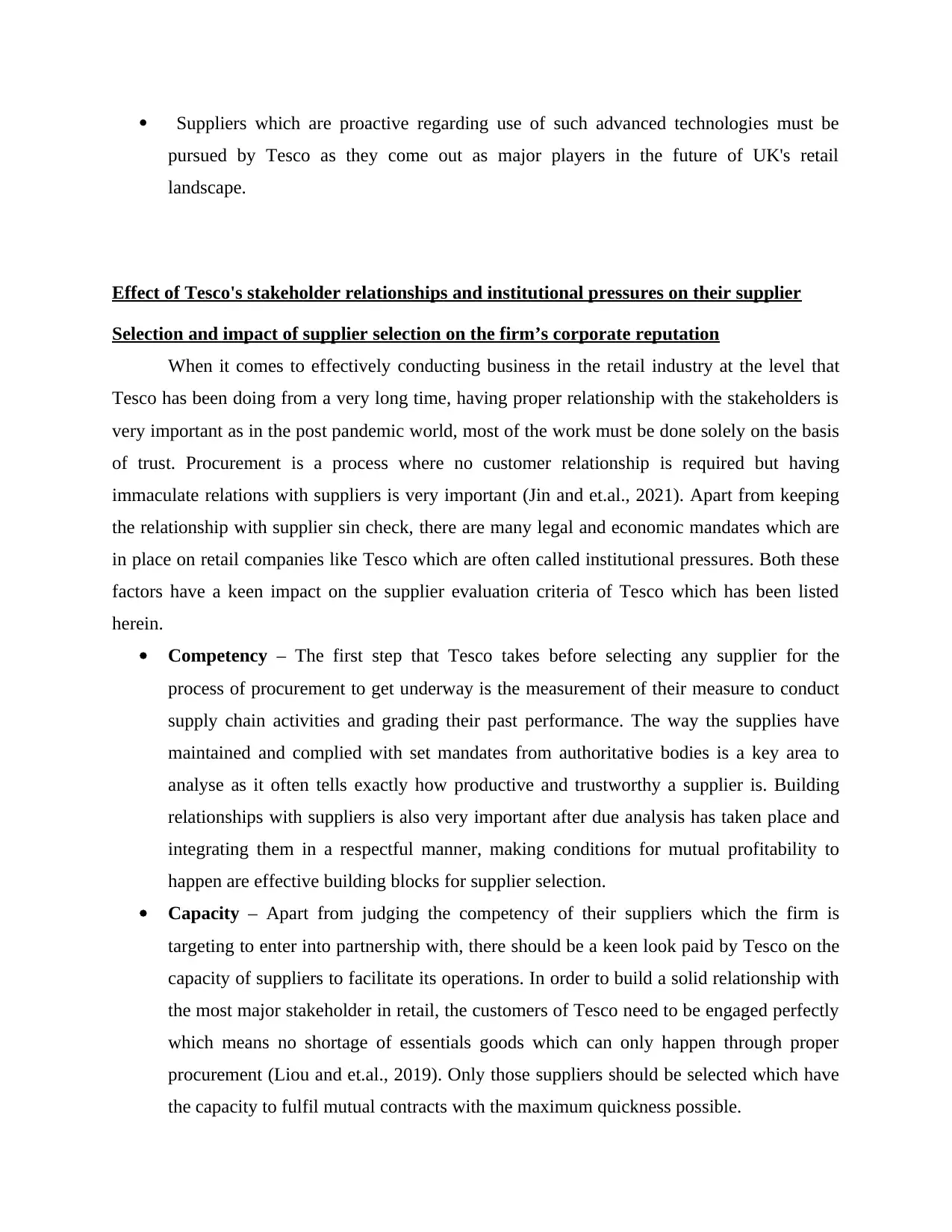
Suppliers which are proactive regarding use of such advanced technologies must be
pursued by Tesco as they come out as major players in the future of UK's retail
landscape.
Effect of Tesco's stakeholder relationships and institutional pressures on their supplier
Selection and impact of supplier selection on the firm’s corporate reputation
When it comes to effectively conducting business in the retail industry at the level that
Tesco has been doing from a very long time, having proper relationship with the stakeholders is
very important as in the post pandemic world, most of the work must be done solely on the basis
of trust. Procurement is a process where no customer relationship is required but having
immaculate relations with suppliers is very important (Jin and et.al., 2021). Apart from keeping
the relationship with supplier sin check, there are many legal and economic mandates which are
in place on retail companies like Tesco which are often called institutional pressures. Both these
factors have a keen impact on the supplier evaluation criteria of Tesco which has been listed
herein.
Competency – The first step that Tesco takes before selecting any supplier for the
process of procurement to get underway is the measurement of their measure to conduct
supply chain activities and grading their past performance. The way the supplies have
maintained and complied with set mandates from authoritative bodies is a key area to
analyse as it often tells exactly how productive and trustworthy a supplier is. Building
relationships with suppliers is also very important after due analysis has taken place and
integrating them in a respectful manner, making conditions for mutual profitability to
happen are effective building blocks for supplier selection.
Capacity – Apart from judging the competency of their suppliers which the firm is
targeting to enter into partnership with, there should be a keen look paid by Tesco on the
capacity of suppliers to facilitate its operations. In order to build a solid relationship with
the most major stakeholder in retail, the customers of Tesco need to be engaged perfectly
which means no shortage of essentials goods which can only happen through proper
procurement (Liou and et.al., 2019). Only those suppliers should be selected which have
the capacity to fulfil mutual contracts with the maximum quickness possible.
pursued by Tesco as they come out as major players in the future of UK's retail
landscape.
Effect of Tesco's stakeholder relationships and institutional pressures on their supplier
Selection and impact of supplier selection on the firm’s corporate reputation
When it comes to effectively conducting business in the retail industry at the level that
Tesco has been doing from a very long time, having proper relationship with the stakeholders is
very important as in the post pandemic world, most of the work must be done solely on the basis
of trust. Procurement is a process where no customer relationship is required but having
immaculate relations with suppliers is very important (Jin and et.al., 2021). Apart from keeping
the relationship with supplier sin check, there are many legal and economic mandates which are
in place on retail companies like Tesco which are often called institutional pressures. Both these
factors have a keen impact on the supplier evaluation criteria of Tesco which has been listed
herein.
Competency – The first step that Tesco takes before selecting any supplier for the
process of procurement to get underway is the measurement of their measure to conduct
supply chain activities and grading their past performance. The way the supplies have
maintained and complied with set mandates from authoritative bodies is a key area to
analyse as it often tells exactly how productive and trustworthy a supplier is. Building
relationships with suppliers is also very important after due analysis has taken place and
integrating them in a respectful manner, making conditions for mutual profitability to
happen are effective building blocks for supplier selection.
Capacity – Apart from judging the competency of their suppliers which the firm is
targeting to enter into partnership with, there should be a keen look paid by Tesco on the
capacity of suppliers to facilitate its operations. In order to build a solid relationship with
the most major stakeholder in retail, the customers of Tesco need to be engaged perfectly
which means no shortage of essentials goods which can only happen through proper
procurement (Liou and et.al., 2019). Only those suppliers should be selected which have
the capacity to fulfil mutual contracts with the maximum quickness possible.
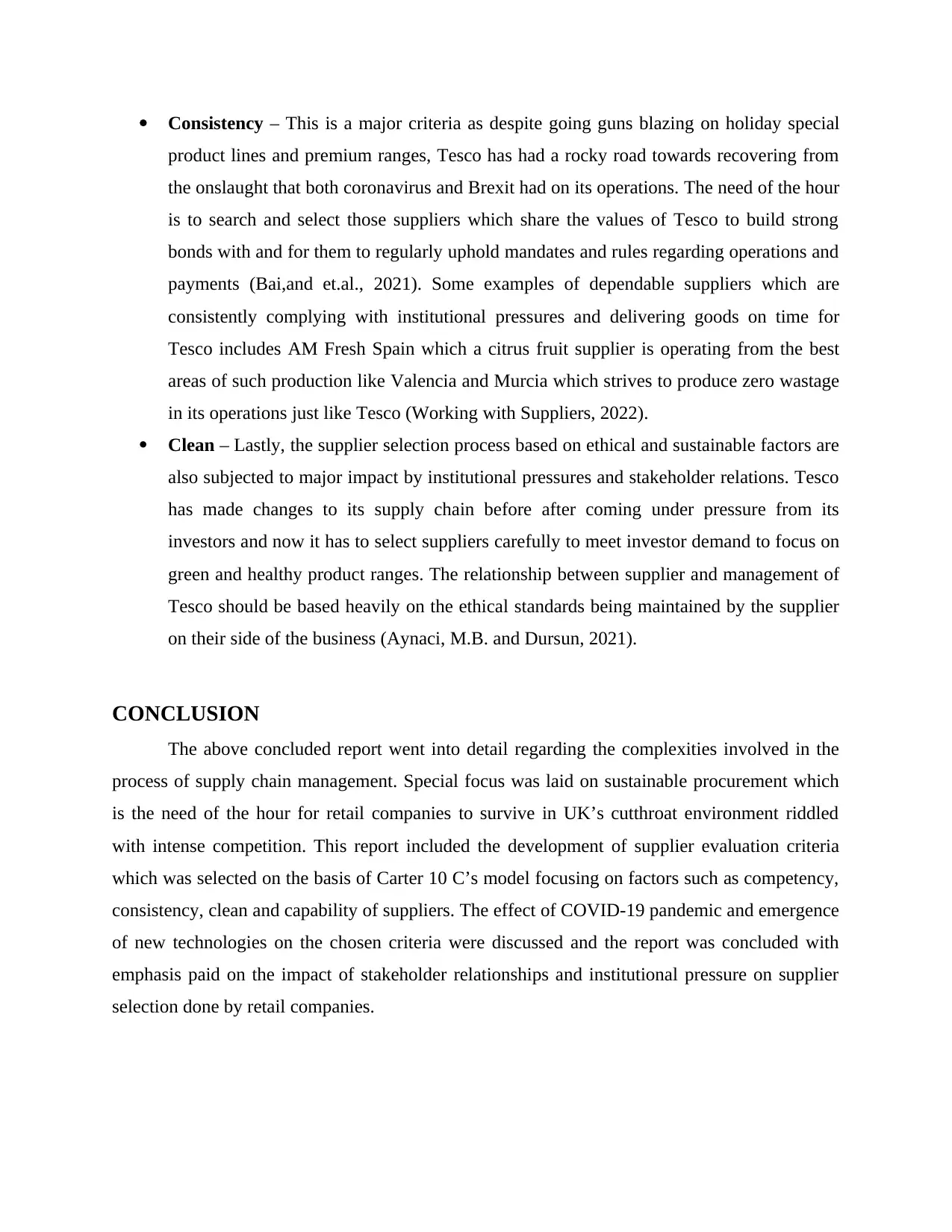
Consistency – This is a major criteria as despite going guns blazing on holiday special
product lines and premium ranges, Tesco has had a rocky road towards recovering from
the onslaught that both coronavirus and Brexit had on its operations. The need of the hour
is to search and select those suppliers which share the values of Tesco to build strong
bonds with and for them to regularly uphold mandates and rules regarding operations and
payments (Bai,and et.al., 2021). Some examples of dependable suppliers which are
consistently complying with institutional pressures and delivering goods on time for
Tesco includes AM Fresh Spain which a citrus fruit supplier is operating from the best
areas of such production like Valencia and Murcia which strives to produce zero wastage
in its operations just like Tesco (Working with Suppliers, 2022).
Clean – Lastly, the supplier selection process based on ethical and sustainable factors are
also subjected to major impact by institutional pressures and stakeholder relations. Tesco
has made changes to its supply chain before after coming under pressure from its
investors and now it has to select suppliers carefully to meet investor demand to focus on
green and healthy product ranges. The relationship between supplier and management of
Tesco should be based heavily on the ethical standards being maintained by the supplier
on their side of the business (Aynaci, M.B. and Dursun, 2021).
CONCLUSION
The above concluded report went into detail regarding the complexities involved in the
process of supply chain management. Special focus was laid on sustainable procurement which
is the need of the hour for retail companies to survive in UK’s cutthroat environment riddled
with intense competition. This report included the development of supplier evaluation criteria
which was selected on the basis of Carter 10 C’s model focusing on factors such as competency,
consistency, clean and capability of suppliers. The effect of COVID-19 pandemic and emergence
of new technologies on the chosen criteria were discussed and the report was concluded with
emphasis paid on the impact of stakeholder relationships and institutional pressure on supplier
selection done by retail companies.
product lines and premium ranges, Tesco has had a rocky road towards recovering from
the onslaught that both coronavirus and Brexit had on its operations. The need of the hour
is to search and select those suppliers which share the values of Tesco to build strong
bonds with and for them to regularly uphold mandates and rules regarding operations and
payments (Bai,and et.al., 2021). Some examples of dependable suppliers which are
consistently complying with institutional pressures and delivering goods on time for
Tesco includes AM Fresh Spain which a citrus fruit supplier is operating from the best
areas of such production like Valencia and Murcia which strives to produce zero wastage
in its operations just like Tesco (Working with Suppliers, 2022).
Clean – Lastly, the supplier selection process based on ethical and sustainable factors are
also subjected to major impact by institutional pressures and stakeholder relations. Tesco
has made changes to its supply chain before after coming under pressure from its
investors and now it has to select suppliers carefully to meet investor demand to focus on
green and healthy product ranges. The relationship between supplier and management of
Tesco should be based heavily on the ethical standards being maintained by the supplier
on their side of the business (Aynaci, M.B. and Dursun, 2021).
CONCLUSION
The above concluded report went into detail regarding the complexities involved in the
process of supply chain management. Special focus was laid on sustainable procurement which
is the need of the hour for retail companies to survive in UK’s cutthroat environment riddled
with intense competition. This report included the development of supplier evaluation criteria
which was selected on the basis of Carter 10 C’s model focusing on factors such as competency,
consistency, clean and capability of suppliers. The effect of COVID-19 pandemic and emergence
of new technologies on the chosen criteria were discussed and the report was concluded with
emphasis paid on the impact of stakeholder relationships and institutional pressure on supplier
selection done by retail companies.
Secure Best Marks with AI Grader
Need help grading? Try our AI Grader for instant feedback on your assignments.
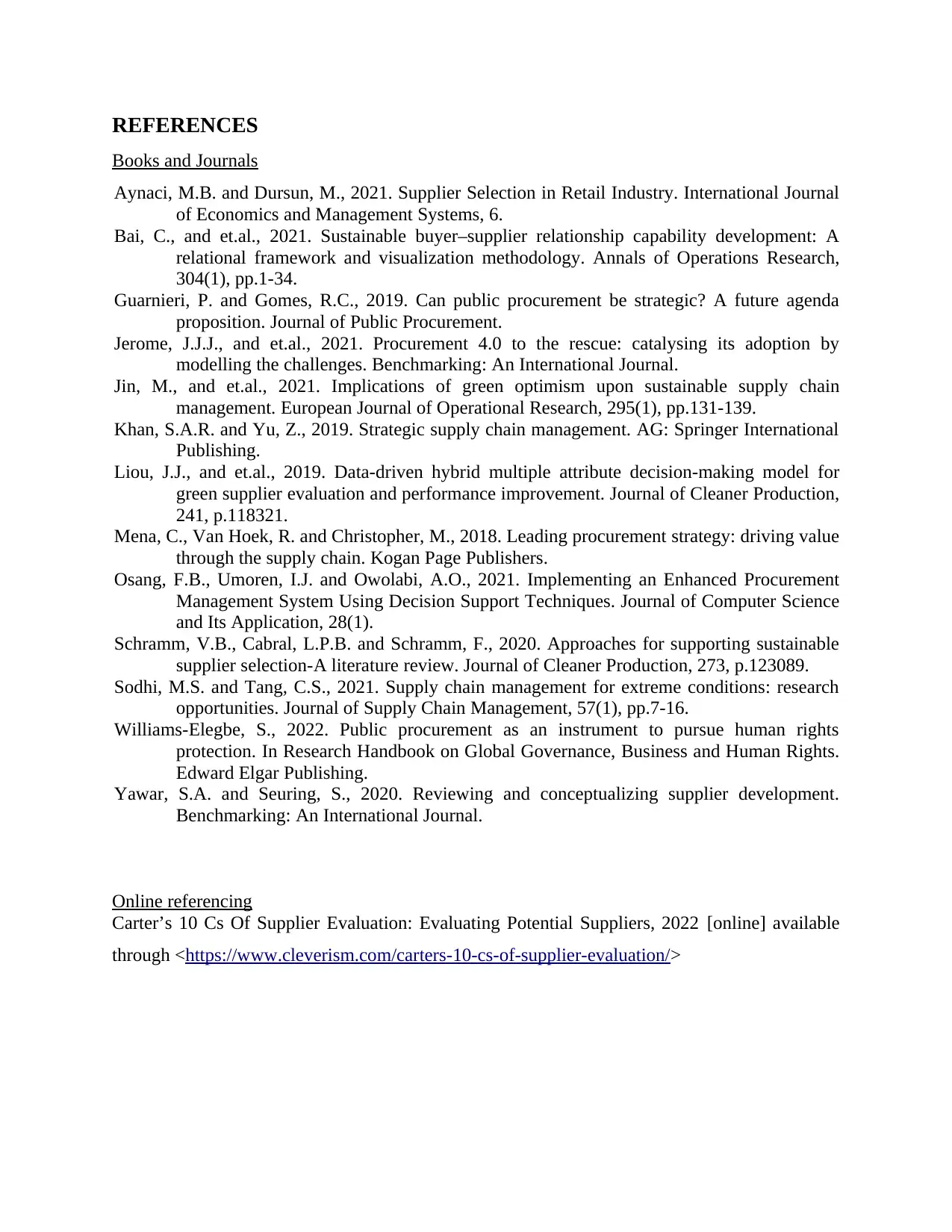
REFERENCES
Books and Journals
Aynaci, M.B. and Dursun, M., 2021. Supplier Selection in Retail Industry. International Journal
of Economics and Management Systems, 6.
Bai, C., and et.al., 2021. Sustainable buyer–supplier relationship capability development: A
relational framework and visualization methodology. Annals of Operations Research,
304(1), pp.1-34.
Guarnieri, P. and Gomes, R.C., 2019. Can public procurement be strategic? A future agenda
proposition. Journal of Public Procurement.
Jerome, J.J.J., and et.al., 2021. Procurement 4.0 to the rescue: catalysing its adoption by
modelling the challenges. Benchmarking: An International Journal.
Jin, M., and et.al., 2021. Implications of green optimism upon sustainable supply chain
management. European Journal of Operational Research, 295(1), pp.131-139.
Khan, S.A.R. and Yu, Z., 2019. Strategic supply chain management. AG: Springer International
Publishing.
Liou, J.J., and et.al., 2019. Data-driven hybrid multiple attribute decision-making model for
green supplier evaluation and performance improvement. Journal of Cleaner Production,
241, p.118321.
Mena, C., Van Hoek, R. and Christopher, M., 2018. Leading procurement strategy: driving value
through the supply chain. Kogan Page Publishers.
Osang, F.B., Umoren, I.J. and Owolabi, A.O., 2021. Implementing an Enhanced Procurement
Management System Using Decision Support Techniques. Journal of Computer Science
and Its Application, 28(1).
Schramm, V.B., Cabral, L.P.B. and Schramm, F., 2020. Approaches for supporting sustainable
supplier selection-A literature review. Journal of Cleaner Production, 273, p.123089.
Sodhi, M.S. and Tang, C.S., 2021. Supply chain management for extreme conditions: research
opportunities. Journal of Supply Chain Management, 57(1), pp.7-16.
Williams-Elegbe, S., 2022. Public procurement as an instrument to pursue human rights
protection. In Research Handbook on Global Governance, Business and Human Rights.
Edward Elgar Publishing.
Yawar, S.A. and Seuring, S., 2020. Reviewing and conceptualizing supplier development.
Benchmarking: An International Journal.
Online referencing
Carter’s 10 Cs Of Supplier Evaluation: Evaluating Potential Suppliers, 2022 [online] available
through <https://www.cleverism.com/carters-10-cs-of-supplier-evaluation/>
Books and Journals
Aynaci, M.B. and Dursun, M., 2021. Supplier Selection in Retail Industry. International Journal
of Economics and Management Systems, 6.
Bai, C., and et.al., 2021. Sustainable buyer–supplier relationship capability development: A
relational framework and visualization methodology. Annals of Operations Research,
304(1), pp.1-34.
Guarnieri, P. and Gomes, R.C., 2019. Can public procurement be strategic? A future agenda
proposition. Journal of Public Procurement.
Jerome, J.J.J., and et.al., 2021. Procurement 4.0 to the rescue: catalysing its adoption by
modelling the challenges. Benchmarking: An International Journal.
Jin, M., and et.al., 2021. Implications of green optimism upon sustainable supply chain
management. European Journal of Operational Research, 295(1), pp.131-139.
Khan, S.A.R. and Yu, Z., 2019. Strategic supply chain management. AG: Springer International
Publishing.
Liou, J.J., and et.al., 2019. Data-driven hybrid multiple attribute decision-making model for
green supplier evaluation and performance improvement. Journal of Cleaner Production,
241, p.118321.
Mena, C., Van Hoek, R. and Christopher, M., 2018. Leading procurement strategy: driving value
through the supply chain. Kogan Page Publishers.
Osang, F.B., Umoren, I.J. and Owolabi, A.O., 2021. Implementing an Enhanced Procurement
Management System Using Decision Support Techniques. Journal of Computer Science
and Its Application, 28(1).
Schramm, V.B., Cabral, L.P.B. and Schramm, F., 2020. Approaches for supporting sustainable
supplier selection-A literature review. Journal of Cleaner Production, 273, p.123089.
Sodhi, M.S. and Tang, C.S., 2021. Supply chain management for extreme conditions: research
opportunities. Journal of Supply Chain Management, 57(1), pp.7-16.
Williams-Elegbe, S., 2022. Public procurement as an instrument to pursue human rights
protection. In Research Handbook on Global Governance, Business and Human Rights.
Edward Elgar Publishing.
Yawar, S.A. and Seuring, S., 2020. Reviewing and conceptualizing supplier development.
Benchmarking: An International Journal.
Online referencing
Carter’s 10 Cs Of Supplier Evaluation: Evaluating Potential Suppliers, 2022 [online] available
through <https://www.cleverism.com/carters-10-cs-of-supplier-evaluation/>
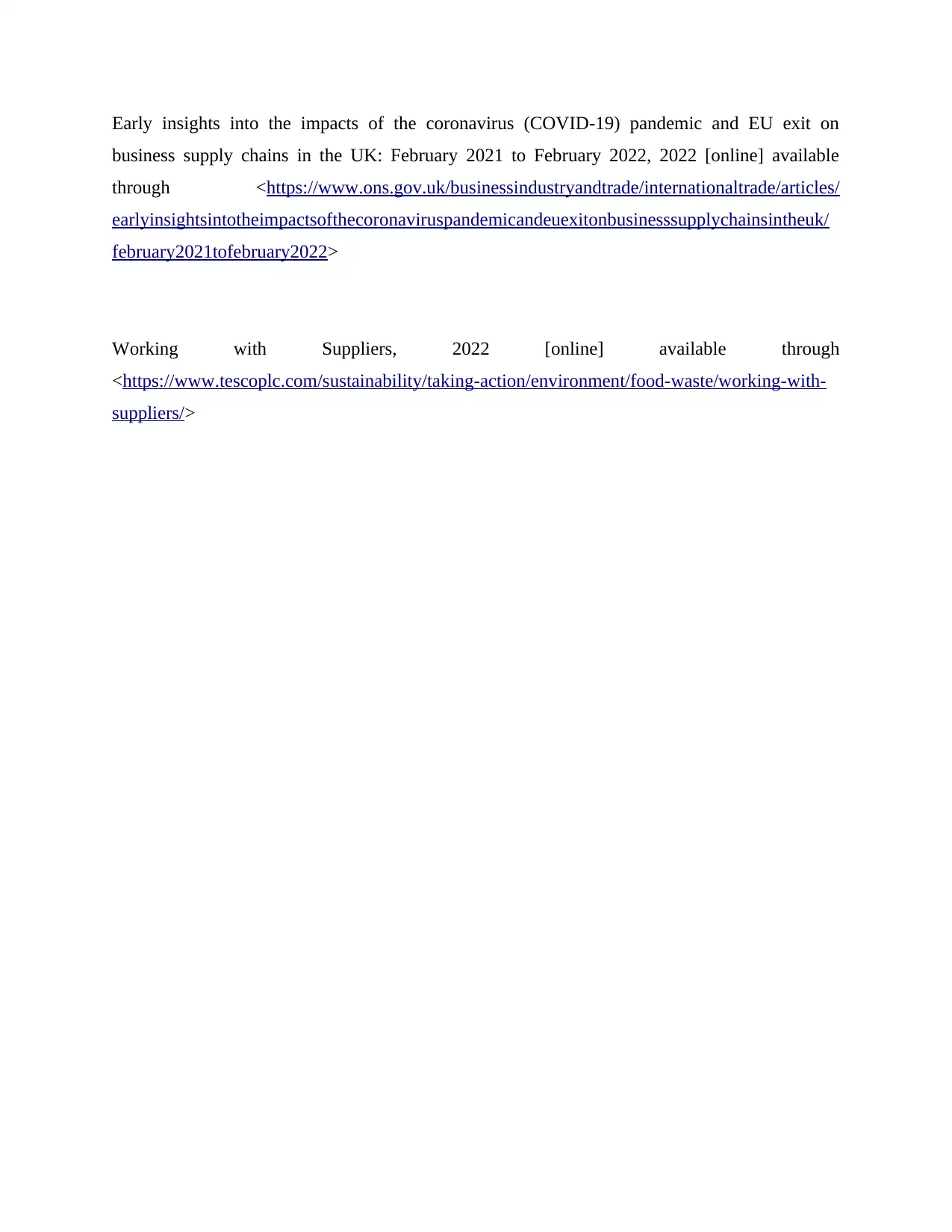
Early insights into the impacts of the coronavirus (COVID-19) pandemic and EU exit on
business supply chains in the UK: February 2021 to February 2022, 2022 [online] available
through <https://www.ons.gov.uk/businessindustryandtrade/internationaltrade/articles/
earlyinsightsintotheimpactsofthecoronaviruspandemicandeuexitonbusinesssupplychainsintheuk/
february2021tofebruary2022>
Working with Suppliers, 2022 [online] available through
<https://www.tescoplc.com/sustainability/taking-action/environment/food-waste/working-with-
suppliers/>
business supply chains in the UK: February 2021 to February 2022, 2022 [online] available
through <https://www.ons.gov.uk/businessindustryandtrade/internationaltrade/articles/
earlyinsightsintotheimpactsofthecoronaviruspandemicandeuexitonbusinesssupplychainsintheuk/
february2021tofebruary2022>
Working with Suppliers, 2022 [online] available through
<https://www.tescoplc.com/sustainability/taking-action/environment/food-waste/working-with-
suppliers/>
1 out of 12
Related Documents
Your All-in-One AI-Powered Toolkit for Academic Success.
+13062052269
info@desklib.com
Available 24*7 on WhatsApp / Email
![[object Object]](/_next/static/media/star-bottom.7253800d.svg)
Unlock your academic potential
© 2024 | Zucol Services PVT LTD | All rights reserved.




